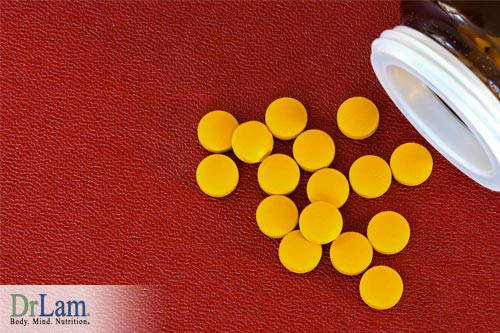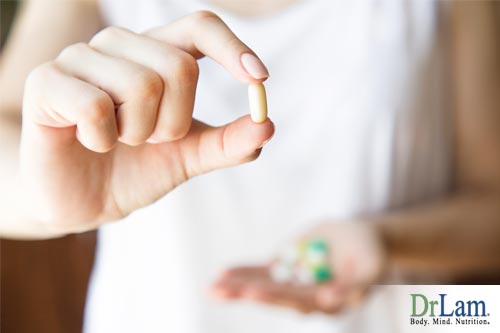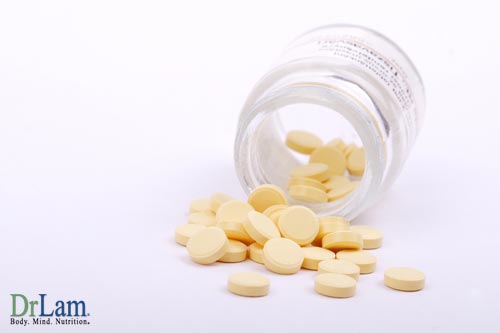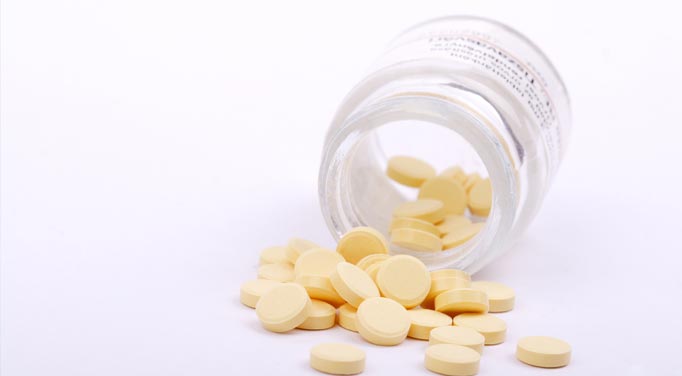 Folic acid deficiency, often together with a lack of vitamin B12, can cause megaloblastic (pernicious) anemia. Only a small amount of folic acid in micrograms (400 mcg to 800 mcg) is needed to overcome this anemia. For decades, the use of folic acid has been limited to this medical deficiency state. The same can be said of vitamin C, where 60 mg a day has been shown to avoid scurvy and used for that purpose only as acceptable standard medical practice. Anything more is considered unwarranted.
Folic acid deficiency, often together with a lack of vitamin B12, can cause megaloblastic (pernicious) anemia. Only a small amount of folic acid in micrograms (400 mcg to 800 mcg) is needed to overcome this anemia. For decades, the use of folic acid has been limited to this medical deficiency state. The same can be said of vitamin C, where 60 mg a day has been shown to avoid scurvy and used for that purpose only as acceptable standard medical practice. Anything more is considered unwarranted.
Over the past four decades, numerous studies have shown a high incidence of folate or folic acid deficiency correlated with a wide variety of illness, especially mental symptoms. These include depression and cognitive decline in epileptic, neurological, psychiatric, geriatric, and psychogeriatric populations. Furthermore, recent studies in elderly people suggest a link between folic acid, homocysteine, aging, depression, and dementia, including Alzheimer's disease and vascular disease. Science now tells us much more about the need for folic acid than what we previously knew. In short, folic acid is a critical nutrient that reduces heart attack death, maintains mental well-being, and prevents crippling birth defects. In fact, folic acid supplementation can prevent the majority of neural tube defects in newborn babies, and all pregnant women are encouraged to take pre-natal vitamins with adequate folic acid for this very purpose.
Sad to say, but only 11 percent of all Americans get enough of folic acid from its main sources - liver, kidney, broccoli, beef, kale, turnip greens, and beat. Cooking destroys as much as 90 percent of a food's folic acid content. The average American over 50 years old only takes in 130 mcg of folic acid per day. The RDA is 400 mcg a day. This means the average American has a folic acid deficiency. Its level is also depleted by chronic alcohol consumption and medications such as anticonvulsant. In fact, studies have shown that eating 400 mcg of folic acid from food alone does not raise the serum folic acid concentration anywhere close to that obtained by simple folic acid supplementation. You need more than what food can provide.
Folic acid is easily depleted by drugs. The NSAID anti-inflammatory drugs, including aspirin and ibuprofen, deplete folic acid and could potentially lead to a folic acid deficiency. The popular class of anti-ulcer drugs known as the H-2 receptor antagonists [Zantac, Tagamet, Pepcid, etc.] also deplete folic acid.
 Instead of encouraging simple folic acid supplementation, the the US Food and Drug Administration implemented a policy of mandating that certain food be "enriched" with folic acid in 1998. Since that time, folic acid was added to certain grain products--including cereals, breads, pasta and flour. This has resulted in higher folate levels in adult Americans. Unfortunately, the amount of enrichment, while enough to protect the pregnant women and the fetus from neural tube defect, is hardly enough for optimum health. Only 636 mcg is present per pound of such "enriched food" . While some of these foods are good, the majority fall into the category of "junk food" because of the high grain and refined sugar content. Obviously, eating junk food as a method to supplement folic acid is not the best way to optimize our health.
Instead of encouraging simple folic acid supplementation, the the US Food and Drug Administration implemented a policy of mandating that certain food be "enriched" with folic acid in 1998. Since that time, folic acid was added to certain grain products--including cereals, breads, pasta and flour. This has resulted in higher folate levels in adult Americans. Unfortunately, the amount of enrichment, while enough to protect the pregnant women and the fetus from neural tube defect, is hardly enough for optimum health. Only 636 mcg is present per pound of such "enriched food" . While some of these foods are good, the majority fall into the category of "junk food" because of the high grain and refined sugar content. Obviously, eating junk food as a method to supplement folic acid is not the best way to optimize our health.
Folic acid is important for the functioning of the nervous system for everyone. There is no exception. A folic acid deficiency has serious implications to health. Without adequate folic acid, the normal developmental process becomes dysfunctional. Symptoms associated with errors of folic acid transport and metabolism include developmental delay, cognitive impairment, movement abnormalities, depression, seizures, vascular changes, and peripheral neuropathy.
In the fetus the relation between maternal folate status and the risk of neural tube defects is well documented. Folic acid deficiency at the time of conception is known to increase risk for birth defects such as spina bifida. Clinical trials have shown that preventive treatment prior to conception with 400 mcg or higher of folic acid significantly reduces the risks of such defects. The RDA is therefore set at this level.
In adult patients presenting with anemia due to folate deficiency, approximately two thirds have neuropsychiatric disorders. If untreated, nearly all patients would eventually develop severe neuropsychiatric complications.
While the exact mechanism of folic acid's association to neuropsychiatric symptoms is still not fully known, mood and some cognitive functions may be related to methylation processes in the brain. With respect to depression, this hypothesis is supported by the similar effect of S-adenosylmethionine to that of folic acid on mood, and by the influence of folic acid and S-adenosylmethionine on monoamine metabolism, which is also incriminated in depression. In fact, it is known that the lowest concentrations of folic acid and S-adenosylmethionine in cerebrospinal fluid are found in dementia, including Alzheimer's disease.
Folic acid deficiency is a totally preventable condition. Yet it exists and is wide-spread. The highest incidence of folic acid deficiency as measured by serum and red cell folic acid concentrations is in elderly populations, especially those with a psychogeriatric background, such as depression. It is interesting to note that folic acid concentrations in serum and cerebrospinal fluid fall and plasma homocysteine rises with age as a natural aging process. It has been shown, in a prospective community study based on 370 healthy elderly Swedish subjects, that a folate or vitamin B-12 deficiency doubled the risk of subsequently developing Alzheimer's disease. This was again confirmed with a much larger and longer Framingham community based study, where a raised plasma homocysteine concentration doubled the risk of developing Alzheimer's and non-Alzheimer's dementia.
 Folic acid is now recognized as an important factor in the prevention of heart disease. Studies have shown that people who suffer heart attacks have lower amounts of both dietary and plasma folic acid. Carotid artery stenosis (leading to strokes) and peripheral vascular disease also appear in high frequency for those with low folic acid level or a folic acid deficiency. Folic acid may lower the risk of heart disease by preventing damage to the inner lining of arteries.
Folic acid is now recognized as an important factor in the prevention of heart disease. Studies have shown that people who suffer heart attacks have lower amounts of both dietary and plasma folic acid. Carotid artery stenosis (leading to strokes) and peripheral vascular disease also appear in high frequency for those with low folic acid level or a folic acid deficiency. Folic acid may lower the risk of heart disease by preventing damage to the inner lining of arteries.
It has been known for about 20 years that a high blood level of homocysteine is a potent and important risk factor for heart disease. After decades of research, it is now accepted that a high homocysteine level is a risk factor for premature death overall, whether it be from heart disease, stroke, cancer, or lung disease. A high homocysteine level is also associated with Alzheimer's disease, as well as depression, multiple sclerosis, menopausal symptoms, and rheumatoid arthritis.
Too much homocysteine, which is formed naturally when protein is broken down, may cause oxidative damage to the endothelium. Oxidative damage is caused by free radicals - byproducts of the body's normal processes that can damage body tissues. In fact, the risk for heart disease triples when the substance's blood level exceeds 15.8 umol/L - a reading still considered by many to be within the "normal " range (The optimum target should be under 8 umol/L). Worse yet, the odds of heart disease are directly proportional to the homocysteine concentration. The higher the homocysteine level, the higher the risk.
This direct correlation has been well researched, including a study conducted at the University of Bergen of 2127 men and 2639 women aged 65 to 67 years between 1992 and 1993. By February 1997, 162 men and 97 women had died; 121 from cardiovascular causes (including stroke), 103 from cancer, and 33 from other causes. Using a baseline homocysteine level of 9.0 umol/L the researchers found that for every 5.0 umol/L increment increase in homocysteine levels all-cause mortality increased by 49 per cent, cardiovascular mortality by 50 per cent, cancer mortality by 26 per cent, and deaths from other causes (respiratory, gastrointestinal and central nervous system diseases) by 104 per cent. Looking at it another way, dropping the homocysteine level by 5 points can reduce heart disease risk by 50 percent. These percentages refer to values obtained after adjusting for a variety of lifestyle factors including cholesterol level, blood pressure, smoking, body mass index, physical activity, age, sex, and baseline cardiovascular disease risk. About 78% of this study group had homocysteine levels at or above 9.0 umol/L and 12% had levels exceeding 15 umol/L. It is interesting to note that Smoking and drinking coffee were associated with higher homocysteine levels while taking vitamins and exercising were associated with lower levels. The result is clear - lower your homocysteine level if you wish to live longer. In another study published in the Journal of the American College of Cardiology (June 1, 2001;37:1858-1863), researchers found that heart disease patients who took 5 milligrams (mg) of folic acid daily (not microgram or mcg) for 12 weeks had slightly better functioning of their arterial inner lining, or endothelium, than those who took an inactive placebo, and a greater ability of their arteries to widen appropriately.
 The good news is that supplementation or fortification of folic acid is necessary to maintain healthy levels of homocysteine. Scottish researchers in a study have concluded that a total intake of 926 mcg per day is needed in 95% of the general population between the ages of 65 to 75 years for prevention of high homocysteine level. Those who already have a high homocysteine level will require more.
The good news is that supplementation or fortification of folic acid is necessary to maintain healthy levels of homocysteine. Scottish researchers in a study have concluded that a total intake of 926 mcg per day is needed in 95% of the general population between the ages of 65 to 75 years for prevention of high homocysteine level. Those who already have a high homocysteine level will require more.
Therapeutic dosage to lower homocysteine level: Folic acid (3 to 20 mg), vitamin B6 (50-100 mg/day), and vitamin B12 (100-1000 mcg/day), in addition to a foundational base of optimum multivitamins, minerals, and enzyme fortification.
Folic acid is also used for cancer prevention and reversal. A Harvard study of 16000 women and 9500 men showed that those who ate 700 mcg of folic acid a day had 2/3 of risk of getting pre-cancerous polyps in colon compare to those taking only 166 mcg per day. Smokers need 3 times more folic acid to have the same effect as non smoker. In another study conducted in China [Gut 2002;50:61-64] , researchers found that animals given a known carcinogen has 62% less chances of developing stomach cancer if 20 mg of folic acid was taken a day.
A folic acid deficiency has also been associated with cancer of the throat and colorectal cancer. According to Dr. Atkins, he typically prescribes 30-60mg a day, together with vitamin C, vitamin B12, and vitamin A to reverse cervical dysplasia, an abnormal cellular change that is pre-cancerous. In another study, cellular dysplasia in smoker's lung has been reversed by taking 10 to 20 mg of folic acid, together with 750 mcg of vitamin B12 over a year's treatment. Folic acid also acts as a painkiller in high doses. A 6.4 mg daily dose plus a little vitamin B12 has been shown to match pain relief property of non-steroidal anti-inflammatory drugs.
The use of folic acid in mega-dose (over 1 mg/day) is practiced by a number of nutritionally oriented physicians for treatment of a wide variety of health problems. Dr. Carlton Fredericks believes that folic acid has estrogen-like effect and can help with menopausal symptoms at dosage of 40-60 mg a day (when taken together with Boron). Dr. Robert Atkins reported using this dose, together with pantethine, essential fatty acids, and a sugar restriction diet for colitis, Crohn's disease, and other painful inflammatory bowel disorders. He reported an 85 percent success rate. A 50 mg daily dose (in the form of methyl folic acid) can treat depression as effective as the drug amitripytline, according to one study. Some doctors have used folic acid successfully in dosage of 20 mg or more without side effects in treatment of postpartum depression.
Some 50 years ago, the FDA set a limit of 800 mcg as the amount that can go into a folic acid supplement, thinking that more folic acid may mask the deficiency of vitamin B12, resulting in people developing pernicious anemia and not knowing it. Contrary to FDA dosage limitation, folic acid has been shown in numerous studies to be one of the safest supplements to take in large amounts. The theoretical possibility of masking a vitamin B12 deficiency can be avoided by taking small amount of vitamin B12 supplement or a diet rich in vitamin B12.
 RDA: 400 mcg a day
RDA: 400 mcg a day
For general heath prevention: 400 mcg 800 mcg a day
For optimum health: 2-6 mg a day
To lower serum homocysteine level: 3-20 mg a day
For cancer reversal, peripheral neuropathy, psoriasis, menopausal symptoms, postpartum depression, colitis : 10-50 mg a day.
NOTE: Folic acid supplements should always be taken in conjunction with vitamin B12 and preferably vitamin B6 as well. In certain cases, intramuscular injection may be most beneficial, such as that used in treatment of peripheral neuropathy. Taking folic acid together with probiotics and digestive enzyme supplementation to increase absorption is recommended. It should be used in conjunction with birth control pill.

